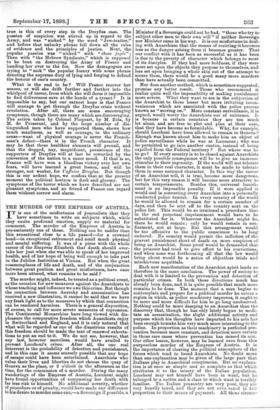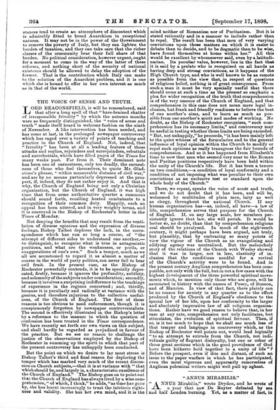THE MURDER OF THE EMPRESS OF AUSTRIA.
IT is one of the misfortunes of journalists that they have sometimes to write on subjects which, while they excite profound emotion, supply no material for comment. The murder of the Empress of Austria is pre-eminently one of these. Nothing can be sadder than this sensational close to a life passed—for a crowned head—in exceptional retirement and amid much physical and mental suffering. It was of a piece with the whole career of the Empress Elisabeth that death should over- take her just when she was able to speak of her improved health, and of her hope of being well enough to take part in the Jubilee festivities at Vienna. But when the great commonplaces of life and death, and of the conjunction between great position and great misfortunes, have once more been uttered, what remains to be said ?
The murder might, indeed, be treated as a political event, as the occasion for new measures against the Anarchists to whose teaching and influence we owe this crime. But though the connection between Anarchy and assassination has received a new illustration, it cannot be said that we have any fresh light as to the measures by which that connection can be rendered harmless. There is a general disposition, of course, to call for more severe measures of repression. The Continental Monarchies have long viewed with dis- pleasure the comparative freedom which Anarchists enjoy in Switzerland and England, and it is only natural that what will be regarded as one of the disastrous results of this freedom should be made the text of renewed exhorta- tions to put an end to it. We do not see, however, that any law, however merciless, would have availed to prevent Luccheni's crime. After all, the one real deterrent is the probability of detection and punishment, and in this case it seems scarcely possible that any hope of escape could have been entertained. Anarchists who value their lives and liberties do not choose the quay of Geneva as the place, or 2 o'clock in the afternoon as the time, for the commission of a murder. During the many wanderings of the Empress of Austria, Luccheni might have found opportunities of compassing her death with far less risk to himself. No additional severity, whether of procedure or of penalty, would have made any difference to his desire to murder some one,—a Sovereign if possible, a Minister if a Sovereign could not be had, "those who try to subject other men to their own will" if neither Sovereign nor Minister came in his way. It is our misfortune in deal- ing with Anarchism that the means of resisting it becomes less as the danger arising from it becomes greater. That our conflict with it has been as successful as it has been is due to the poverty of character which belongs to most of its disciples. If they had more boldness, if they were more set upon the objects they propose to themselves, and less set upon bringing a whole skin out of the attempt to secure them, there would be a good many more murders than have actually been committed.
Nor does another method, which is sometimes suggested, promise any better result. Those who recommend it realise quite well the impossibility of making punishment more severe. What they want to see is the subjection of the Anarchist to those lesser but more irritating incon- veniences which are associated with the police process known as "moving on." More constant surveillance, it is argued, would worry the Anarchists out of existence. It is because in certain countries they are too much let alone, and are free to plot and plan at their ease,. that they have become so formidable. Why, for example, should Luccheni have been allowed to remain in Geneva Enough was was known about him to make him an object of police surveillance while he was at Lausanne ; why was he permitted to go into another canton, instead of being expelled from the Federal territory ? But where was he to go ? If every country is to be closed against Anarchists the only possible consequence will be to give an immense stimulus to their ingenuity. If the world will not tolerate them in their real character, it must be made to tolerate them in some assumed character. In this way the career of an Anarchist will, it is true, become more dangerous, but for this very reason it will become more attractive to certain temperaments. Besides this, universal banish- ment is an impossible penalty. If it were applied it would end in converting every Anarchist into a personally conducted police tourist. In every country of the world he would be allowed to remain for a certain number of days, and then be sent off to the country next on the police list. This would be so irrational a procedure that in the end perpetual imprisonment would have to be substituted for it. Wherever the Anarchist might be.
there he would remain; only he would remain in con- finement, not at large. But this arrangement would be too offensive to the public conscience to be long- endured. No country would permit the infliction of the gravest punishment short of death on mere suspicion of being an Anarchist. Some proof would be demanded that the prisoner had tried to give effect to his convictions, and when none was forthcoming all that the law would bring about would be a series of objectless trials and mischievous acquittals.
Each new manifestation of the Anarchist spirit lands us therefore in the same conclusion. The power of society to.
deal with it is limited to the prevention and detection of particular crimes. In both these directions much has already been done, and it is quite possible that much more remains to be done. The moment that a man begins to contemplate and prepare for a political murder he enters a region in which, as police machinery improves, it ought to be more and more difficult for him to go long unobserved.
Nothing could be more damping to an Anarchist than the discovery that, though he has only lately begun to medi- tate an assassination, the slight additional activity and purpose which his thoughts have imparted to his acts has been enough to make him very much more interesting to the police. In proportion as their machinery is perfected pre- vention becomes more constant, and detection more certain in those rare cases where prevention has missed its aim. One other lesson, however, may be learned even from this purposeless murder of the Empress of Austria. It is the importance of clearing the political atmosphere of the forces which tend to breed Anarchists. No doubt more than one explanation may be given of the large part that Italians play in Anarchical conspiracies. But no explana- tion is at once so simple and so complete as that which attributes it to the misery of the Italian population.
Luccheni may not himself have been in want, but he belonged to a nation and a class to which want is terribly familiar. The Italian peasantry are very poor, they are very heavily taxed, and they are not even taxed in fair proportion to their means of payment. All these circutn- stances tend to create an atmosphere of discontent which is admirably fitted to breed Anarchism in exceptional natures. It may not be in the power of the Government to remove the poverty of Italy, but they can lighten the burden of taxation, and they can take care that the richer classes of the community bear their full share of that burden. No political consideration, however urgent, ought for a moment to come in the way of the latter of these reforms, and nothing short of the security of national existence should be allowed to delay the adoption of the former. That is the contribution which Italy can make to the solution of the Anarchist problem, and it is one which she is bound to offer in her own interest as much as in that of the world.



































 Previous page
Previous page